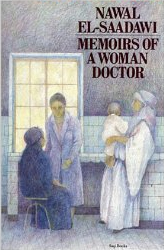Memoirs of a Woman Doctor
By Nawal el-Saadawi
Translated by Catherine Cobham
London: Saqi Books, 2000, 101 pp.
Nawal el-Saadawi wrote "Memoirs of a Woman Doctor," 30 years ago, when, as a young woman in her 20s, she had just graduated from the School of Medicine in Cairo. Considered a revolutionary feminist novel from the time of its 1957 debut as a serial in the Egyptian magazine Ruz al-Yusuf, it was heavily censored, as were subsequent publications in book form. Since then, the novel has been reprinted several times in both Cairo and Beirut, but was never to be published in its entirety, because she had lost the original manuscript.
Written in the first person, "Memoirs" is a novel, and the author has repeatedly insisted it is not autobiographical, although the heroine is a young Egyptian woman studying and then practicing medicine. El-Saadawi herself studied psychiatry in Cairo, going on to become director of public health in Egypt. The narrator's life, like Saadawi's, is a series of battles, and she is from the beginning a rebel who challenges the restrictions on the role of women in the family, society and the world of the mind.
Since the publication of "Memoirs of a Woman Doctor," Saadawi has gone on to write 32 books, mostly dealing with Arab women, colonialism, fundamentalism and globalization. She writes in Arabic, and her books, including novels and studies of women in the Arab world, have been translated into more than 30 languages. Her views on women, such as those she discussed in "Women in Sex," in 1969, led to her being dismissed from the Ministry of Health, and even to being imprisoned under Sadat in 1981, which inspired her 1984 work "Memoirs from the Women's Prison." In 1992, she fled Egypt for five years after her name appeared on a death list issued by an Islamic fundamentalist group. She has now completed writing her autobiography.
Yet she looks with fondness on this, her first opus, as she notes in the author's preface:
"I still consider 'Memoirs' like a first daughter, full of youthful fervor and expressing a reality which is still relevant today. It is a simple, spontaneous novel in which there is a lot of anger against the oppression of women in my country, but also a great deal of hope for change, for wider horizons and a better future."
In flowing narrative that often verges on stream-of-consciousness, the nameless heroine of "Memoirs" deals with the issues that implode on her young mind. The body and its functions becomes the spine of the heroine's evolution from a young girl who is denied the privileges and freedoms her brother has, to a woman medical student, the only girl in a class of men.
The physical body becomes symbolic of societal gender roles. The young heroine is disgusted at her own physical signs of emerging femininity because they seem to doom her to an oppressed, secondary role, while those born male will be elevated, merely because of their bodily form. In the dissecting room, the young heroine notes the glaring contrast between man's elevated status when he is alive and his equality with that of a woman corpse, proof to her that it is society alone that elevates the man. Ultimately, she will encounter many of society's tragedies through her medical work, yet she always looks beyond the physical, for she finds much of the sickness is not in the human body, but in society.
As she experiences death and birth in her patients, she struggles with issues of existence. "The focus of the struggle inside me widened out from masculinity and femininity to embrace human-kind as a whole," the narrator notes, as she tracks a failed marriage and a subsequent rise to medical success that still leaves her feeling empty. It was not until years after she completed medical school, during a retreat in the countryside, to a country villa, that she finally lets herself feel, which Saadawi describes in moving prose, chronicling the journey from imprisonment to freedom.
This review appeared in Al Jadid Magazine, Vol. 6, No. 33, Fall 2000.
Copyright © 2024 AL JADID MAGAZINE

